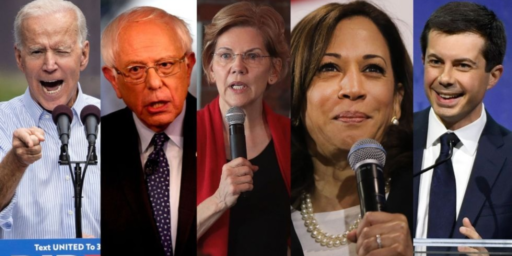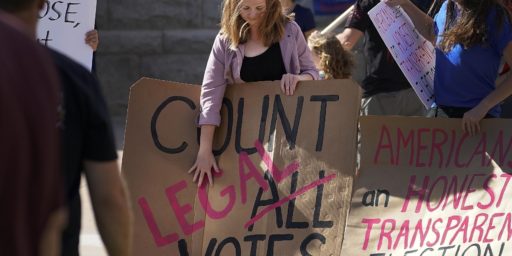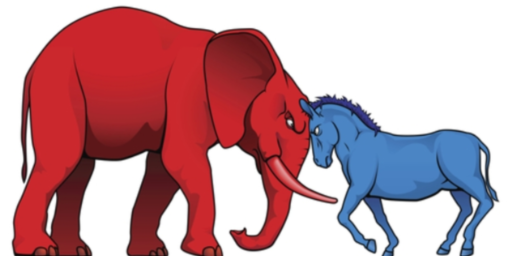Current Polls Worse Than Meaningless
The current Republican primary polls are "measuring a unicorn electorate" yet effect the outcome of the race.
University of San Francisco political scientist Ken Goldstein argues that the current Republican primary polls are “measuring a unicorn electorate.” The main critique that we level is that voters are simply paying too little attention at this point and know too little about the candidates, making the results almost entirely about name recognition. That’s all true. But Goldstein contends that we’re not even looking at the likely primary voters.
The first problem with trying to measure the attitudes of a target population of the national Republican primary electorate is that such an electorate does not actually exist in the quite the same way that other electorates do. The presidential nominating process is a dynamic one, with primaries and caucuses that could theoretically play out over a five-month period. The size and shape of the electorate in each state will be determined by whether the race is still competitive when it reaches a particular state and by the number of candidates still running. Put another way, probably only Republican caucus goers in Iowa and, perhaps, primary voters in New Hampshire, will have the chance to choose between the current crop of candidates. And that’s making the outlandish assumption that none of the candidates drop out in the next few months.
With 17 candidates in the race, it’s probable that the race will continue to be meaningful longer than in most recent contests. But, yes, some significant number of the candidates will likely be out of the race before Iowa, much less New Hampshire and their “supporters” will have a different set of choices available to them by the time they can actually vote than they have now.
What percentage of registered votes or how many people do these surveys assume will take part in the GOP nominating process? Let’s look at the recent Fox News poll. The survey sampled 1,019 registered voters and was conducted by a Republican firm, Shaw and Company, and a Democratic one, Anderson Robinson Research, using high-quality methods such as live interviewers and a standard dual frame design including both landline and cell phones. The results on a variety of questions such as whether voters approve of President Obama’s job performance are perfectly in line with all the other public polls that have recently been released.
To its credit, the survey also asked questions to gauge how likely respondents were to take part in a presidential primary or caucus and in which party’s contest they were likely to participate. This screening question yielded 389 registered voters (or 38 percent of registered voters in the country) who said they were likely to vote or caucus in the battle for the Republican nomination. Among this group, the survey found Donald Trump ahead of the field by 3 percentage points over Scott Walker. More importantly, in the contest to be invited to the debate in Cleveland, John Kasich and Rick Santorum tied for 10th with each capturing 2 percent, besting Carly Fiorina and Rick Perry, both of whom polled at 1 percent, and just behind Chris Christie with 3 percent.
That may be too small a sample size to begin with. And the fact that voters don’t have a strong opinion on Kasich and Fiorina right now doesn’t mean they couldn’t rise in the polls. But the main problem is simply that most of those candidates are in one undifferentiated cluster at this stage.
So, while it’s hard not to observe that a grand total of six poll respondents—that’s six actual human beings—separate the ninth-place candidate from the 13th, let’s look at the survey’s assumptions about the size of the Republican electorate.
From the Census Bureau’s Voter Supplement to the Current Population Study, we know that there are 150 million registered voters in the country. So, the 1,019 respondents to the Fox survey correspond to the opinions of 150 million Americans. Accordingly, 38 percent of registered voters (those who were asked their GOP nominee preference) means that these 389 respondents represent the preference of just over 57.2 million voters. Is that a plausible estimate of the number of people who will take part in the 2016 Republican nominating contest?
Well, actually, no. In 2012, 19 million Republicans took part in the nominating contest. In a more competitive race with a wider GOP field in 2008, 21 million took part in the nominating contest. On the other side in 2008, for some additional context, in the highest number of voters ever to take part in a nominating contest, just over 37 million took part in Democratic primaries and caucuses. (By the way, want to start a fight in Hillary Clinton’s Brooklyn HQ, ask old Obama and Clinton staffers who won the most votes and what should have been done with Michigan and Florida vote totals.) And, in the 2012 general election, Mitt Romney received 61 million votes. Put another way, the Fox News-survey, and most other surveys of Republican primary preferences are using samples that represent target populations that are nearly equal to the total number of votes that Mitt Romney received in the general election in 2012, about three times as large as recent primary electorates and almost twice as large as the record-shattering Democratic primary electorate in 2008. While there are lots of candidates and some enthusiasm on the GOP side, it is not likely to approach 60 million, as the Fox and other recent polls assume.
Even if GOP turnout more than doubles from 2012 and exceeds Democratic turnout in 2008, the attitudes of 20 million non-primary participants are being included in these polls. If their attitudes differ from the other 40 million, then the polls are not an accurate representation of who is winning—and certainly not an accurate representation of who is in 11th place, is such a thing is even possible.
None of that would much matter if all we were trying to do is predict the eventual nominee. At this point, that’s a mere parlor game with no real consequences. But, as Goldstein points out, it will have real world consequences this year because they’re going to be the basis of deciding who is allowed on the debate stage. While I can’t conjure a scenario wherein Carly Fiorina wins the nomination, it’s not inconceivable that a John Kasich emerges as the representative of the “Chamber of Commerce” wing of the party if Jeb Bush were to falter. Yet that can’t happen if he’s left off the debate stage and thus rendered a non-candidate.
s







Using polls to determine eligibility for a debate is admittedly an imperfect method, but I’m not sure what other objective method there is and I think that a debate with 17 people on the state would be insanely unmanageable and uninformative. Indeed, a ten-person debate is unlikely to be useful for anything other than whatever Donald Trump sound bites come out of it.
FOX news is not looking for meaningful political debate but for eyeballs viewing the flat screen. The realty show clown, Trump, will draw viewers which is what they are after.
This is the problem with dragging the process out so long. The primaries should be confined to a two-month period. The funny thing is, for most people, they are. It’s only the political class and the reporters who are keeping track of this stuff.
I agree completely, James, but I think your bitch is with the supposedly liberal MSM for their horse race reporting and, as @Ron Beasley: points out, with FOX News for turning this “debate” into a cheap reality show.
The polls are not meaningless it’s rather that they don’t reveal quite what people expect them to reveal.
What the polls show me above and beyond everything else is that GOP voters are indifferent to Jeb, the presumptive Billionaire’s Purse Dog. Jeb looks very weak, and the longer he goes on looking weak, the weaker he will get in fact. Ditto Rubio.
The second thing the polls show me is the focus on candidates who will deliver plenty of incoherent rage. The Rage Caucus (Trump, Cruz, Huckabee, Carson, Jindal,) is at about 40%. The Billionaire’s Caucus (Walker, Jeb, Rubio, Kasich) also has about 40%.
The billionaires are going to have to join ranks behind Walker, Jeb, Kasich or Rubio. They need a purse dog who looks like a front runner. Bush looks weak. So, will the billionaires back Walker or Kasich?
So many fun questions. Who will finally become the Official Purse Dog of the Billionaire’s Caucus?
And will the billionaires be able to simply ignore the Rage Caucus? Or will the billionaires back Walker in hopes he can channel the incoherent rage while still nibbling tasty bits of kibble from Sheldon Adelson’s gnarled fingers?
And if Trump stays in the 20% range while nevertheless being sidelined by the billionaires, will he slink quietly away? Or will he vengefully launch a third party effort?
@Doug Mataconis:
These things are pointless and inane anyway, might as well make them entertaining at least. Having the full GOP Clown Car unloading on the same stage would make for some nifty TV.
@Mikey: I never watch debates. The only thing of interest is reaction the next day. I may get a big bowl of popcorn and watch this one.
@michael reynolds:
Like the last two cycles. I’ve been trying for a year or more to figure out who’d be the anointed establishment candidate this time. I’m stumped. I’m wondering if we’re seeing a real split within the billionaire wing.
@michael reynolds: I think that the organizational costs for a third party run will cost more than Trump will be willing to spend. He can’t simply declare that he is third party and file to run in all 50 states IIRC.
@Ron Beasley: How exactly can a network have a fair multi-person debate without inviting the highest-polling candidate? If they were including some preferred nth-ranked candidate, or arbitrarily setting the number of candidates lower to exclude someone, I could understand your complaint. But that’s not the case here. I don’t see a fair way out.
@Just ‘nutha ig’rant cracker:
Except the threat of a third party run should be enough to extract some worthwhile payoff.
@Pinky: How about randomly assigning all the candidates to two debates, both taking place during prime time? That might be unfair to the candidates who are slotted into the second debate, so flip the order and have another set of debates 2 weeks later, and so on.
@humanoid.panda: I’d be fine with that. I’ve suggested similar plans. I’ve said that I’d like to see shorter primaries, but public leaders and intellectuals should always be debating. It’s just that Ron complained about Fox inviting the top candidate, and it’s really hard to see how they’re to blame for it.
I’m more interested in candidates’ positions than in public debates, but again, you can’t argue that a debate that includes the highest-polling candidate represents some kind of discontinuity in American political tradition. The odd thing here is the number of low-polling candidates, not the presence of a high-polling candidate.
Is it?
There is an alternative hypothesis, which is that the media are paying too much attention, while failing to remedy the “know too little about the candidates” complaint in any meaningful way.
Honestly, at this point in time a copy of the Press Kit for each candidate would be more informative than the sum total of everything the press (including most of the blogosphere) has done with those kits so far. That’s pathetic.
@charon: I can see that, but what does the GOP have that Trump might see as an advantageous payoff–Ambassador to The Hair Club for Men?
I don’t see him as the service to his country type.
@Pinky: I don’t think you heard what Ron said. I took what he was saying as an assertion that Fox is less concerned with a reasonable political debate than they are with Nielsen points. In my perception of the usefulness of Fox News (and I used to watch it about 15 or so years ago and stopped because the shows were too stupid for words), his assertion has some merit.
I read no complaint about including the leading
clowncandidate. Did I miss something?@Just ‘nutha ig’rant cracker: Ron’s comment had two sentences. I’m assuming they’re related. He said,
Do you think he meant simply that Fox has got to be happy about Trump’s appearance? If so, why mention Fox? Presumably every outlet that has debates will include Trump as long as he’s among the top candidates. I was left with the impression that he was criticizing FNC, implying that their action (that is, the presumed invitation to Trump) was based on eyeballs rather than debate. If I’m wrong on that, my apologies to Ron. But if I am wrong about it, then that comment of his was a bad non sequitur.